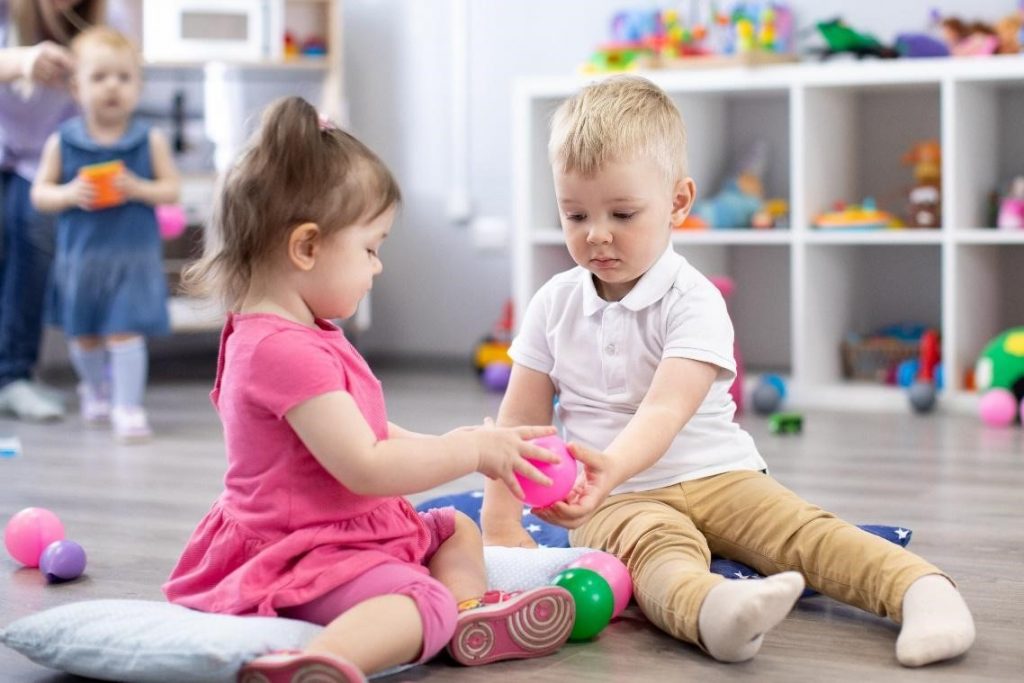Help the children in your care learn language skills with everyday activities
Learning to talk is one of the most important milestones of early childhood development, and developing language skills is an ongoing educational process that is essential to every other subject and area of life. After all, clear and effective communication is at the core of social, academic, and professional success.
A baby’s first word is more than a cute little accomplishment; it’s a foundational element of intellectual learning and of developing a sense of self. Help encourage language skills in the babies and toddlers in your care to give them the tools they need to communicate effectively.
Ages and activities
The development of language skills begins at birth. Although babies are unable to talk, they still communicate with their caregivers to convey their wants and needs. It’s never too early to work on enhancing this skill, and a caregiver should continue to do so through early childhood.
Use the following milestones and suggestions to incorporate language-related activities into your curriculum.
Birth to 3 months
By the time they are 3 months old, many infants can:
- Make happy cooing sounds
- Calm down or smile when a trusted adult speaks
- Have a variety of cries to represent different needs
- Recognize the voices of familiar people
Encourage language skills by:
- Singing to babies or reciting simple rhymes
- Talking to babies as if they understand
- Having quiet time so they can babble and play uninterrupted
3 to 6 months
When they are 6 months old, babies may be able to:
- Make a wider range of sounds, including babbling, gurgling, and cooing
- Use their tone of voice to express happiness or sadness
- Track the direction of sounds with their eyes
- Respond to changes in the tone of a caregiver’s voice
Encourage language skills by:
- Holding babies close and make eye contact when talking
- Talking in a range of tones, indicating happiness, surprise, and excitement
- Imitating the sounds babies make
- Repeating words they seem interested in
6 to 12 months
By the time babies are a year old, they are often capable of:
- Saying simple words like “mama” or “dada”
- Imitating speech sounds
- Understanding simple instructions
- Recognizing words for common items
Encourage language skills by:
- Playing games like Peek-a-Poo or Pat-a-Cake that incorporate hand movements
- Using adjectives to describe toys and surroundings
- Showing babies their reflection in a mirror and ask, “Who’s that?”
- Asking simple questions like, “Where is the kitty?” and point to demonstrate
12 to 18 months
At 18 months old, many toddlers can:
- Follow simple directions and accompanying gestures
- Say up to 10 words
- Recognize the names of people, objects, and body parts
Encourage language skills by:
- Asking toddlers about pictures and books and ask them to name items
- Building on words they know by adding adjectives (i.e., The ball is big and red)
- Asking questions and give them choices
- Showing enthusiasm when they use a word
- Encouraging pretend to play with stuffed animals and act out scenarios
18 to 24 months
By the time a child is 2 years old, many can:
- Ask one or two-word questions
- Follow simple commands
- Use simple phrases, such as asking for more of something
- Speak approximately 50 words
- Communicate clearly enough to be understood, at least half the time
Encourage language skills by:
- Requesting help such as asking them to put away books
- Teaching them easy songs, games, and nursery rhymes
- Asking them to tell you about a new toy or a pet at home
- Providing opportunities for pretend play such as talking on the phone or playing with a doll
2 to 3 years
At 3 years old, children have more advanced language skills, like the ability to:
- Use more words to create simple sentences
- Answer more complex questions
- Act out imaginary scenes and engage in pretend play
Encourage language skills by:
- Teaching children their name
- Asking about the size, shape, or quantity of items
- Asking for their opinions, predictions, or summaries about a favorite book or story
- Presenting questions in an open-ended way to encourage longer answers
As with all development in early childhood, children reach milestones at different ages. The above suggestions are simply general guidelines and not necessarily a cause for concern if a child has yet to meet a specific goal.
Talk to the children in your care as often as possible and encourage language-building opportunities in a fun and natural way to set them up for a lifetime of successful communication. The Virginia Infant & Toddler Specialist Network helps improve the quality of care for infants and toddlers through extensive resources, services, and education for caregivers. Learn more about how we can help you improve the standard of care.




